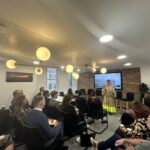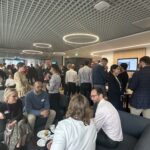13 September 2024
On 10 September (Tuesday), LocatED successfully launched its first-ever Festival of Government Property, drawing around 80 attendees to a day filled with insightful sessions and networking opportunities. The event, held both virtually and in person, focused on enhancing collaboration, professional growth, and tackling property challenges across the public sector.
On 10 September (Tuesday), LocatED successfully launched its first-ever Festival of Government Property, drawing around 80 attendees to a day filled with insightful sessions and networking opportunities. The event, held both virtually and in person, focused on enhancing collaboration, professional growth, and tackling property challenges across the public sector.
Key highlights of the event:
The first session on networking and presentation skills was led by LocatED’s Chief Executive Lara Newman, emphasising the importance of networking in professional development. Participants explored effective networking strategies, shared personal tips, and engaged in interactive discussions. Lara also provided a masterclass on presentation skills, highlighting design tips and delivery.
In the second session, which featured a panel from Government D&I Shadow Boad and was led by LocatED’s Program Lead for Net Zero and Governance, Nadia Persuad, the importance of genuine career narratives in professional development was explored. The panellists talked about their unexpected professional journeys. They discussed their professional development, obstacles they overcame, and accomplishments. The key takeaway for many was that career can often benefit from taking a zigzag path.
At noon, participants went to a networking lunch hosted by WSP. Individuals from different industries and various professional stages relished the chance to interact, exchange ideas, and gain knowledge from one another. Once more, networking is about expanding one’s horizons and forming relationships.
The fourth session of the day was a panel discussion led by LocatED’s Head of Net Zero and Estates Efficiency, Will Atlee, on achieving net zero across government property and how to accelerate delivery. Speakers highlighted the role of sustainability in government property strategies, emphasising the need to integrate sustainability at the core rather than as an add-on. The strategy needs to focus on reducing emissions while ensuring efficient use of resources with a recognition that sustainability and climate adaptation are key risks in the public sector in spending decisions. They also stressed the need to engage and prepare the next generation for careers in green industries. There has been a growing awareness that the construction industry needs to attract young talents with education efforts geared towards emerging technologies and sustainability practices.
Finally, the event was wrapped up by the ‘fishbowl’ panel discussion on best use of assets led by LocatED’s Associate Direct (Estates Efficiency), Rav Cheema. The discussion highlighted the challenge of dealing with large amounts of unused or obsolete buildings and spaces across the UK, particularly in urban centres. Many of these spaces are no longer suitable for modern digital, creative, or economic needs, leading to a need for retrofitting to improve environmental performance and unlock potential.
Some key points from the panel discussion:
- There is a growing need to retrofit old buildings rather than demolish them, as they can play significant roles in revitalising town centres and supporting the evolution of spaces. This includes collaboration between the public and private sectors to make these spaces viable and sustainable.
- The challenge lies in raising funds for retrofitting and adapting buildings to modern standards. Traditional models of leasing and occupation may no longer be fit for purpose, and innovative ways of funding and leasing need to be explored, such as engaging public sector involvement and experimenting with new leasing models.
- The public sector often plays a crucial role in activating these spaces when the private sector fails to do so.
- Engaging local communities is key to the successful reuse of these spaces. Empowering communities to manage and use these buildings can enhance social value. Community interest companies and resident-led boards are ways to involve people directly in managing the assets they use.
- For spaces that remain in transition, entrepreneurial approaches are needed. Short-term uses such as pop-up offices, shared workspaces, and flexible leasing models can help mitigate costs and make these spaces more productive in the interim.
- It is essential to foster trust and deep engagement with communities when managing assets. Traditional community engagement can be expensive, but the long-term benefits of fostering trust, shared ownership, and collaboration far outweigh the costs. Innovative tools like AI platforms and community review panels can aid in this process.
Thanks to all the participants for making it a resounding success.

















